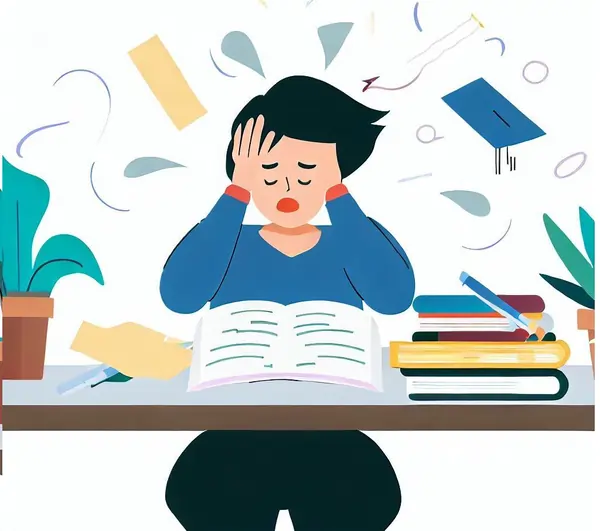Discover effective techniques to conquer exam anxiety and stress, paving the way for academic success and personal growth. Learn how to stay calm, focused, and confident during exams while cultivating a positive mindset and healthy study habits. This comprehensive guide will equip you with the tools to overcome anxiety, enhance cognitive function, and excel in your educational journey.
Overcoming Exam Anxiety and Stress: Strategies for Success
As the clock ticks down to exam day, many students experience a surge of anxiety and stress. The pressure to perform well in classes, including challenging ones like probability, can be overwhelming, leading to sleepless nights, nervousness, and decreased focus. However, it's essential to remember that experiencing exam anxiety is entirely normal and manageable. In this blog, we will explore the causes of exam anxiety, its impact on academic performance, and most importantly, practical strategies to cope with and overcome these challenges, whether you're preparing for a regular exam or getting ready to take your probability class. By adopting these techniques, students can transform their exam experience from a source of fear and apprehension into an opportunity for growth and success

1. Understanding Exam Anxiety
Exam anxiety is a psychological response to the fear of failure or inadequate performance during examinations. This anxiety can manifest in various ways, such as increased heart rate, sweaty palms, restlessness, and difficulty concentrating. The fear of disappointing oneself or others can significantly impact a student's confidence and motivation, leading to a negative spiral of stress and poor academic outcomes.
The Causes of Exam Anxiety
Exam anxiety, also known as test anxiety, is a prevalent issue that affects students of all ages and academic levels. The fear of exams and the pressure to perform well can create a high-stress environment, leading to various physical and emotional symptoms. Understanding the root causes of exam anxiety is essential for effectively managing and addressing these challenges. Let's delve into some common causes of exam anxiety:
- Unrealistic Expectations
- Lack of Preparation
- Fear of Judgement
- Comparison to Others
- Past Negative Experiences
One of the primary causes of exam anxiety is the burden of unrealistic expectations placed on students, either by themselves or others. Pressure to achieve exceptionally high grades can create a constant fear of failure and inadequacy. When students feel the need to meet certain standards to gain approval or validation from parents, teachers, or peers, the fear of disappointing others intensifies their anxiety.
To combat this, it is crucial to recognize that perfection is not attainable, and mistakes are a natural part of the learning process. Emphasizing the importance of effort and growth rather than solely focusing on grades can help alleviate the weight of unrealistic expectations.
Insufficient preparation or poor study habits can contribute significantly to exam anxiety. When students feel unprepared or underconfident in their knowledge and abilities, they are more likely to experience anxiety about their performance.
Procrastination and cramming are common study habits that can exacerbate feelings of unpreparedness. Instead, students should establish a consistent and structured study routine well in advance of the exam date. Breaking down the material into manageable chunks and studying regularly can boost confidence and reduce anxiety.
The fear of being judged based on exam results can be a potent trigger for exam anxiety. Students may worry that poor performance will lead to negative perceptions from teachers, peers, or family members, impacting their self-esteem and self-worth.
It is essential to remember that exam results do not define one's intelligence or worth as a person. Encouraging a growth mindset and understanding that mistakes are opportunities for learning can help students detach their sense of self from their exam performance.
Constantly comparing oneself to high-achieving peers can lead to feelings of inadequacy and self-doubt. The pressure to measure up to others' successes can be overwhelming and foster a sense of competition that is detrimental to one's mental well-being.
Instead of comparing yourself to others, focus on your individual progress and growth. Everyone has unique strengths and weaknesses, and success should be measured against personal achievements and improvements.
Previous negative experiences with exams, such as failure or poor performance, can leave a lasting impact on students' minds and increase their anxiety about future exams. The fear of repeating past mistakes can create a cycle of stress and avoidance.
To break this cycle, students should reframe their perception of failure. Instead of viewing it as a setback, consider it a learning opportunity. Analyze past mistakes to identify areas for improvement and develop a plan to address them in future exams.
Consequences of Exam Anxiety
Exam anxiety can have a profound impact on a student's overall well-being and academic performance. The stress and fear associated with exams can lead to a range of consequences, affecting both physical and mental health as well as educational outcomes.
- Impaired Cognitive Functioning: One of the primary consequences of exam anxiety is impaired cognitive functioning. High levels of stress can disrupt the brain's ability to think clearly, process information, and recall learned material. This can result in difficulties in understanding exam questions, making it challenging to provide accurate and coherent answers.
- Reduced Focus and Concentration: Anxiety can lead to restlessness and an inability to concentrate effectively during exams. As a result, students may struggle to maintain focus on the questions at hand, leading to incomplete or rushed responses.
- Time Management Difficulties: Under the pressure of exam anxiety, students may find it challenging to manage their time efficiently during exams. They might spend too much time on certain questions, leaving insufficient time to complete the rest of the paper adequately.
- Test Anxiety Loop: Exam anxiety can create a vicious cycle. The fear of failure and the inability to cope with stress can lead to poor performance in exams. Subsequently, the disappointing results may fuel more anxiety in future exams, perpetuating the cycle of stress and underperformance.
- Negative Emotional Impact: The emotional toll of exam anxiety can be significant. Students may experience feelings of self-doubt, inadequacy, and hopelessness, which can lead to a decrease in self-esteem and self-confidence.
- Physical Symptoms: Exam anxiety can manifest physically, with symptoms such as increased heart rate, sweaty palms, dizziness, stomach aches, and headaches. These physical manifestations can further exacerbate emotional distress and distract students from their exam tasks.
- Avoidance Behavior: Some students may develop avoidance behaviors as a coping mechanism for dealing with exam anxiety. They might skip study sessions, procrastinate, or even miss exams altogether to avoid facing their fears.
- Impact on Academic Performance: Ultimately, the consequences of exam anxiety can significantly impact academic performance. Students who experience high levels of anxiety may not be able to showcase their true abilities and knowledge, leading to lower grades and academic achievements.
Coping Strategies for Exam Anxiety
Experiencing anxiety before and during exams is a common challenge that many students face. The fear of failure, performance pressure, and uncertainty about the outcome can lead to overwhelming stress. However, by adopting effective coping strategies, students can manage their anxiety and approach exams with a calmer and more focused mindset. Let's explore some essential coping techniques to conquer exam anxiety and achieve better academic results.
- Mindfulness and Meditation
- Effective Study Techniques
- Set Realistic Goals
- Maintain a Healthy Lifestyle
- Seek Social Support
- Visualization Techniques
- Practice with Past Papers
- Positive Self-Talk
Mindfulness and meditation have gained significant recognition for their positive impact on mental well-being. These practices involve being fully present in the moment, accepting thoughts and feelings without judgment, and focusing on the breath. Engaging in mindfulness exercises before and during exams can help students calm their minds, reduce stress, and improve concentration.
To practice mindfulness, find a quiet space, sit comfortably, and take deep breaths, focusing on the sensations of each inhale and exhale. As thoughts arise, acknowledge them without getting caught up in them and gently guide your attention back to your breath. Regular mindfulness exercises can train the mind to stay present and centered during high-pressure situations, such as exams.
One of the primary contributors to exam anxiety is a sense of unpreparedness. Implementing effective study techniques can not only improve academic performance but also boost confidence and alleviate anxiety.
The Pomodoro Technique is a popular method for enhancing productivity and concentration. It involves breaking study sessions into short intervals, usually 25 minutes, followed by a 5-minute break. After completing four cycles, take a more extended break of around 15-30 minutes. This technique helps maintain focus, prevents burnout, and provides a sense of accomplishment with each completed study session.
Setting achievable goals is crucial for managing exam anxiety. Unrealistic expectations of perfection can create undue pressure and intensify stress. Instead, break down your study and exam preparation into smaller, manageable tasks. Set specific goals for each study session, such as covering a particular topic or practicing a set of problems. Celebrate your achievements as you progress, which will boost your confidence and motivation.
A healthy lifestyle is fundamental for managing anxiety and stress. Ensure that you are getting enough sleep, as sleep deprivation can negatively impact cognitive function and memory recall. Aim for 7-9 hours of quality sleep each night.
Regular physical exercise is another excellent way to reduce stress and improve overall well-being. Engage in activities that you enjoy, such as jogging, yoga, or dancing. Exercise releases endorphins, which are natural mood lifters that can help combat anxiety.
Additionally, pay attention to your diet. Avoid excessive caffeine and sugary foods, as they can contribute to feelings of restlessness and nervousness. Instead, opt for a balanced diet rich in fruits, vegetables, whole grains, and lean proteins.
During periods of exam anxiety, it's essential to lean on the support of friends, family, or mentors. Discussing your concerns and fears with someone you trust can provide emotional relief and reassurance. Sometimes, merely venting your feelings can alleviate stress significantly. Your support system can offer encouragement and help you gain perspective on the situation.
Visualization involves mentally rehearsing a successful exam experience. Before the exam, take a few moments to close your eyes and visualize yourself entering the exam hall feeling confident and composed. Picture yourself calmly reading through the questions, answering them with ease, and experiencing a sense of accomplishment as you complete the exam. This technique can build a positive mindset, boost self-assurance, and reduce anxiety.
Familiarity with the exam format and question types can boost your confidence and reduce uncertainty during the actual exam. Practice solving past papers under timed conditions to simulate the exam environment. Reviewing the solutions afterward will help identify areas of strength and weakness, allowing you to focus your study efforts effectively.
Be mindful of your inner dialogue and replace negative thoughts with positive affirmations. Remind yourself of your capabilities, past achievements, and the effort you've put into preparing for the exam. Positive self-talk can cultivate a strong belief in your abilities and reduce self-doubt.
Conclusion
Dealing with exam anxiety and stress is a challenge that many students face. However, by understanding the root causes of anxiety and implementing effective coping strategies, it is possible to transform this experience into a catalyst for growth and success. Remember that exam results do not define your worth or potential; they are merely stepping stones in your educational journey. By nurturing a positive mindset, adopting healthy study habits, and seeking support when needed, you can navigate through exam periods with greater confidence and resilience. Embrace the opportunity to learn from your mistakes and celebrate your achievements along the way. You've got this!
